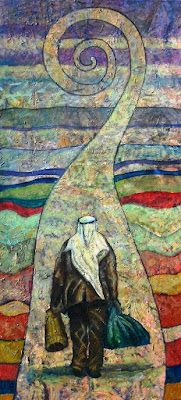 |
|
in the Givat Haviva Collaborative Art Center |
The day of the “Nakba” – the “catastrophe” – is the day the Palestinian
people commemorates the tragedy that befell them in 1948, when between 700,000
and 1,000,000 Palestinians became refugees in the West Bank, Gaza, Arab states,
and other places around the world, and many others became “internal refugees,”
uprooted from their homes, who came to live elsewhere in Israel.
The Nakba is an open wound that burns and throbs in Palestinian
collective memory. For twenty percent of the citizens of our country, Israel,
Nakba Day symbolizes their national trauma of expulsion and destruction, and
the personal and family trauma of losing relatives, homes, land, trees and
flowers – a loss that has accompanied their families and people since 1948. In
order for us to be able to have a shared life here, we must heal the rifts and accept
our different identities. In order to have a future of peace, we must build a
foundation of a shared society in the present, based on recognition, equality,
trust, sincerity, and goodwill, to accept each other and the harm we inflict on
each other.
Both sides have a need to express their pain, fear, and anger, and to
have their own sense of harm recognized. This is possible without blaming the
other, simply by recognizing the others’ suffering and taking personal and
collective responsibility. This is why it is so important to stop Israel’s institutionalized
efforts to ignore the Nakba. The sooner we can change and consent to be
changed, the sooner we can accept the Nakba, the harm, and the associated
responsibility, the sooner we can bring peace and an end to the violence. As we
cultivate our ability to understand that the Nakba continues today (in
Palestine, in our country, and around the world, there is already a fourth
generation of Palestinian refugees), we will hasten our reconciliation and mutual
recognition, and enhance our ability to maintain Israel as the nation-state of
the Jewish people, which is also a state of all its citizens, with full
equality for its Arab-Palestinian citizens. That is why I feel compelled today
to commemorate the Nakba.
Thus, together with my partners, Arab-Palestinian citizens of Israel, we
will succeed in building a shared society here, and to turn conflicting
identities into inclusive identities. This is how we will build a bridge to
peace, to ensure the future of our country and of our children.
Yaniv Sagee,
Givat Haviva

Comments
Post a Comment